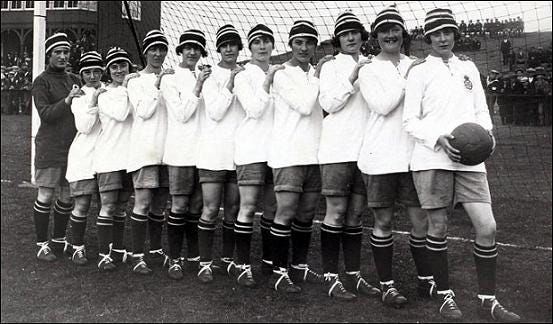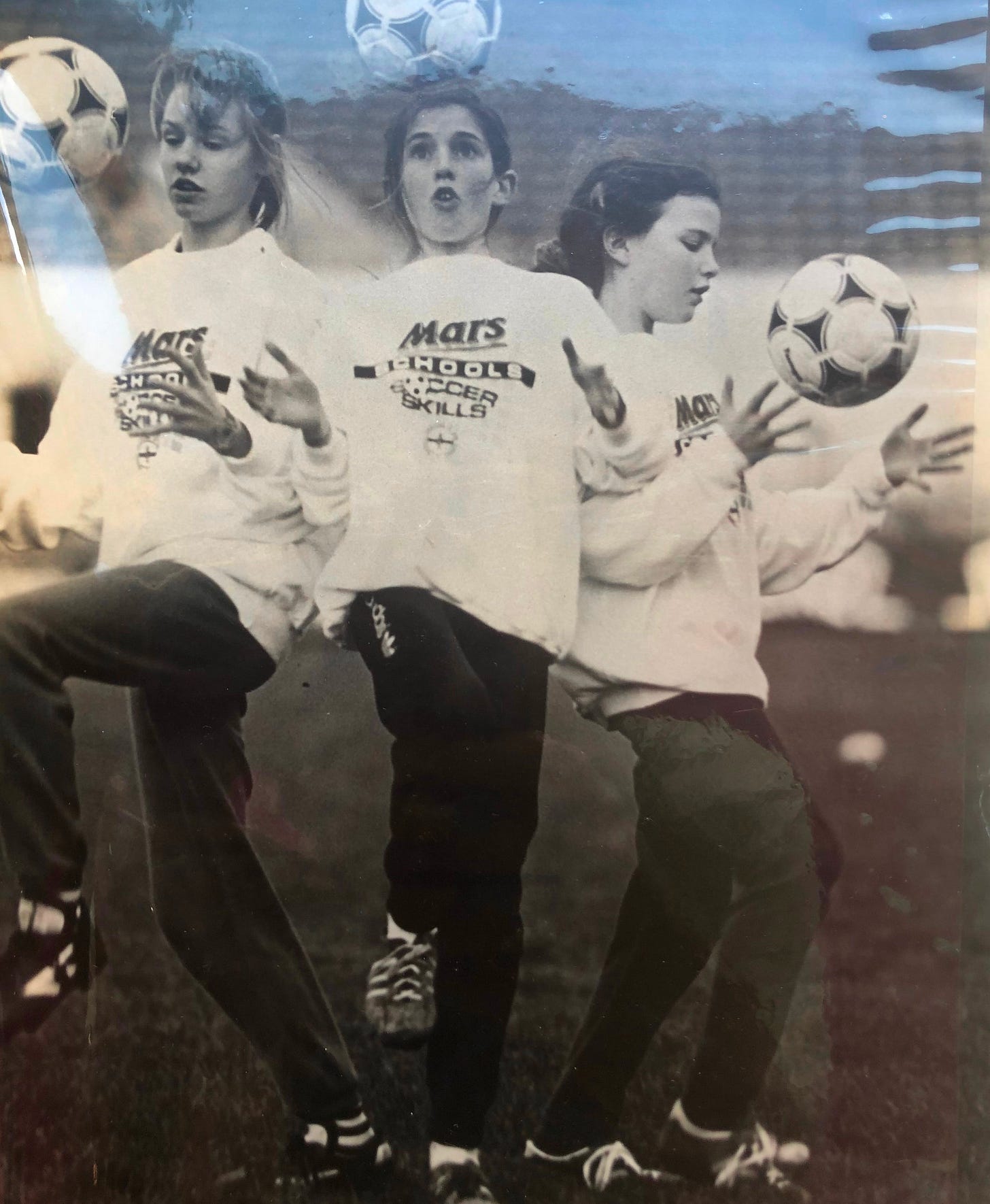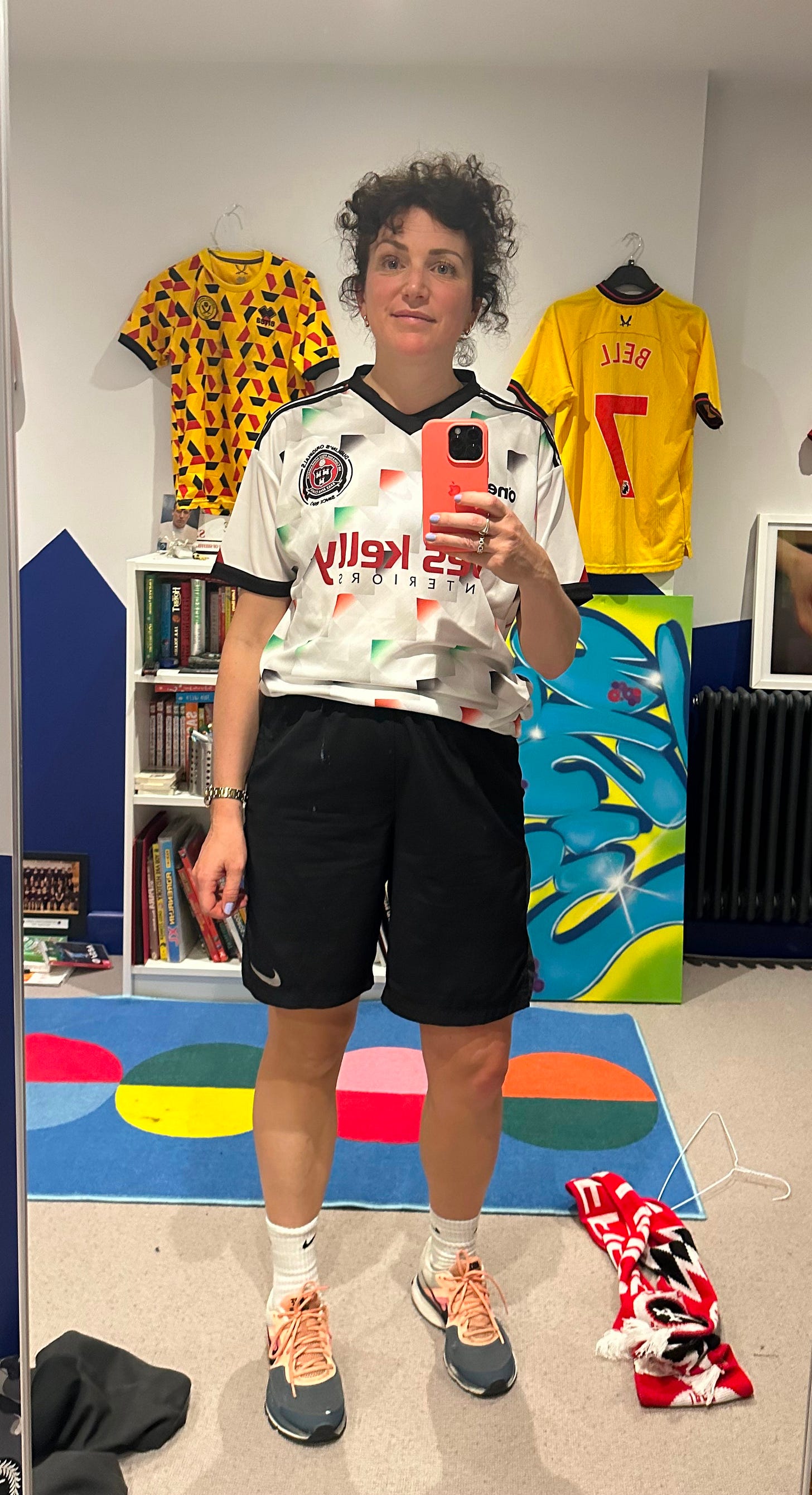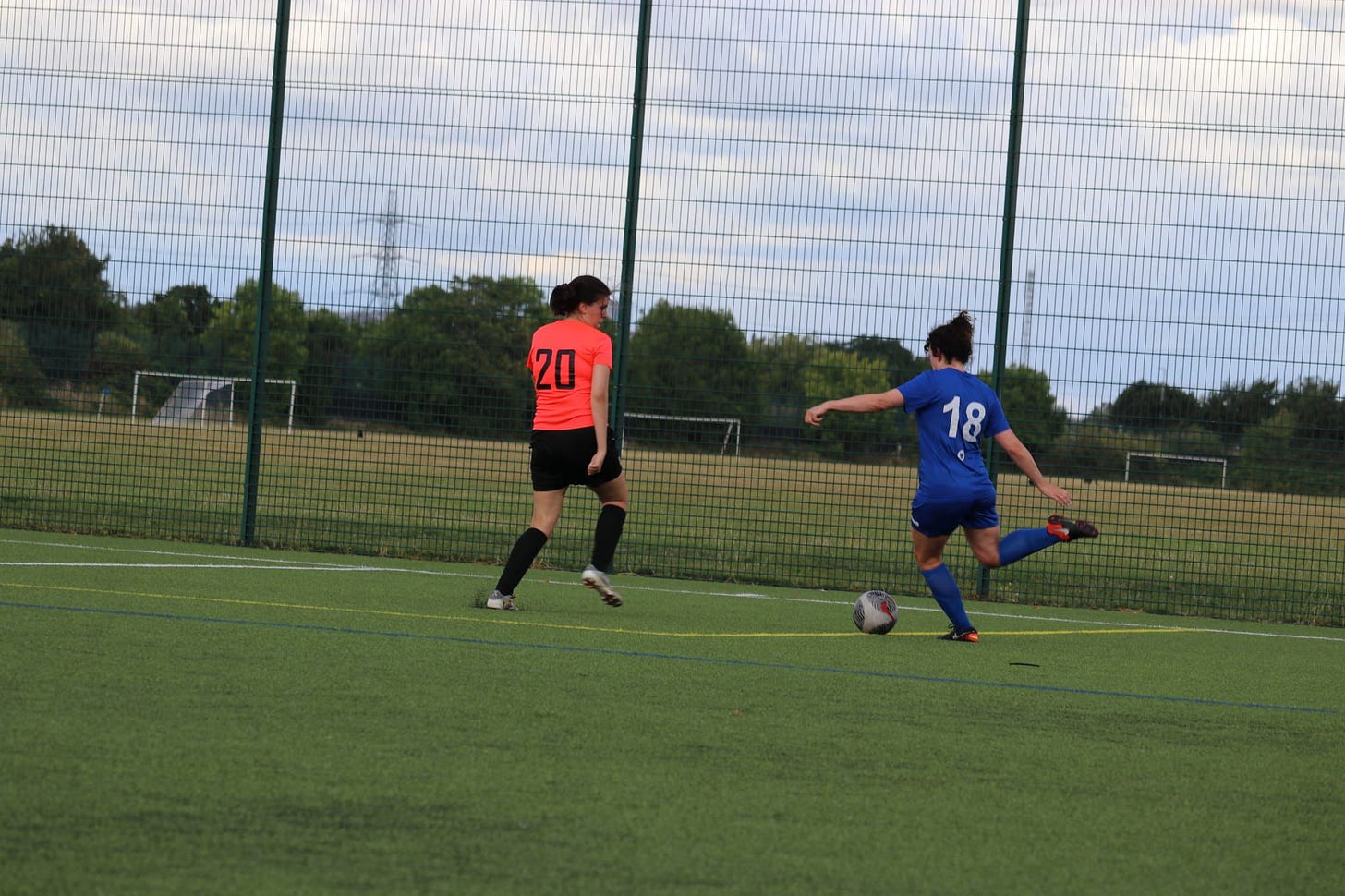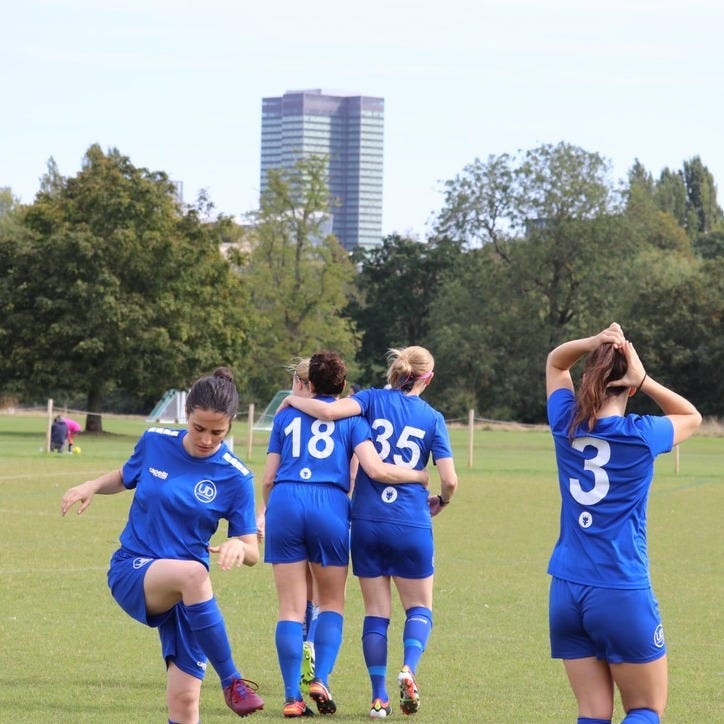Imagine a football pitch in a London Park on a warm Sunday afternoon in late September. There is a game in play, two teams from the Greater London Women’s Football League are fighting it out at 2 - 2 . On each side of the pitch, the teams respective coaches pace up and down shouting instructions. The left winger of the home team is new; this is her second match with her club and she has been on high alert, watching, listening, trying to stay calm in her head while her heart thumps wildly in her chest. With twenty minutes left to play, she is passed the ball. She controls it and starts to run down the left wing. A defender from the opposing team runs towards her, and instead of tackling with her feet, the defender barges the winger with her shoulder, knocking her out of the way in order to win the ball. The winger manages to stay on her feet but she’s outraged. This defender has played dirty from the start. After keeping quiet for the whole game, the winger, her face coloured in the exact red of a ripe tomato, walks towards the referee and holds her arms out in front of her, beseeching;
“Ref?!?! You’ve got to be kidding.”
The winger is me.
I am forty six years old and I am a footballer.
It all started with the Euros. It was the height of Summer 2022, my family were gathered around the television in an Irish holiday home, watching the Lionesses play against Germany in the final. We were all rooting for England on behalf of my English husband and my half English sons. It was a sold out crowd and an attendance record for Wembley. When Chloe Kelly scored with eleven minutes to go, it was pure joy. I was so moved that my kids, my brothers and my Dad were all watching Women’s football, and that it was being treated and spoken about equally to Mens. Gabby Logan’s final words at the end of the broadcast were goose-pimply good;
"The Lionesses have brought football home. Now it’s down to the rest of us to make sure it stays here. You think it’s all over? It’s only just begun.”
The history of women and football is fascinating. The oldest football in the world was discovered behind the panelling of Mary Queen Of Scots bedroom wall in Stirling Castle. It would have been used in the 1540s. Apparently Queen Mary was into football; she recorded a game of football in her diaries while at Carlisle Castle. I like to imagine Mary throwing off her corset to do keepie-uppies in the castle garden.
The first official body of Women’s football was formed in 1895 but Women’s football really came into its own during World War One. Women had to increasingly take on jobs that had been held by men up to that point, most prolifically in factories. Encouraged to exercise together to boost morale and aid productivity, the women chose to play football and started their own teams.
By 1921 there were about 150 women’s football clubs. Their matches were wildly popular with the public, some drawing up to 45,000 fans, but after the war, the men returned and many football playing women left the factories and went back to domestic life. Then the FA came out with a ban.
“the game of football is quite unsuitable for females and ought not to be encouraged.”
For the next fifty years, women’s football was delegitimised. Women could no longer play at a professional level. Women’s clubs were unable to use FA affiliated pitches or facilities. Women’s football carried on of course, but the players had to endure woeful treatment. They played in public parks and smaller grounds that couldn’t house many fans. There was little to no funding. And even after the ban got lifted in 1971, it took another twenty years for real strategy to be put in place to develop the women’s game in England.
Now we have the Women’s National League which means there are club academies, as there is in Men’s football. Above that the Women’s Super League is hugely popular. Just last week Chelsea signed the San Diego Wave defender Naomi Girma for a record fee of $1.1 million dollars. But the discrepancy between Women and Mens football in terms of pay is still heinously large.
I interviewed Lionesses captain and Arsenal star Leah Williamson on my Changes podcast. She talked about how after they won the Euros, the game was flooded with corporate sponsorship and funding, but what moved her most was the Dads of daughters she would meet. Dads who ran a girls football sessions because their daughter wanted to play and there was nowhere for her to play. After the Euro’s those Dads had seven different age groups of girls playing week in week out.
I would have loved to play on a girls team as a kid. Instead I played on the boys team in school and at home I spent my days playing with the local lads on the little patch of green in our estate. At ten years old I was chosen along with two other girls from our school to help publicise the launch of the Mars School soccer skills programme in Ireland. We made the papers! I took so much pride in being able to play. But when I went to secondary school there were no options for girls to play football, so I played hockey instead.
After watching the Lionesses win the Euros, Women’s football was in my head. I spoke to my friend Monki - who plays for Dulwich FC. She encouraged me to look for some clubs in London. Too many women quit she said. She had even started her own campaign to highlight the myriad of reasons women stop playing sport. Puberty, body awareness, pregnancy, motherhood, careers, the list was long and frustratingly predictable, but the stats that she found for her campaign were truly shocking.
A 2022 research piece by Women In Sport found that only a quarter of girls (26%) in primary school feel confident when they play sport, compared to 43 per cent of boys.
One in two ( 42%) women are not active enough for good health. ( GOV.UK 2022)
56% of women over the age of 55 are inactive. (Sport England 2022)
Girls seemed to drop out of team sports during adolescence and never return, whereas men seemed more likely to stay the course. We see plenty of middle aged men playing five a side football. Where were the women? I just wanted a weekly kick about, surely I could find one somewhere?
I got talking to a club in East London on DM, they’re called Goal Diggers and they looked really fun and inclusive, but they played too far away from where I lived. However they did invite me to their first over 40s women’s football session.
It had been thirty three years since I had last played a football match. I borrowed my sons astro turf boots and hid my hair in a cap. I was nervous. It wasn’t just the playing, it was the walking in and not knowing anyone. I arrived late to see a group of women learning how to dribble. They were all shapes and sizes and all different ages; from forties up to sixties. When we played a game at the end of the session, we were hesitant at first but the coaches were so encouraging, and slowly, it all started to click into place. My body remembered what to do. I was play making, making runs, passing through-balls, and it felt amazing. By the end we were all red faced and grinning. The coaches gave out prizes. I got a medal for player of the match. I tell you I have never felt such pride as stepping forward to accept that little cardboard crest off the coach.
I rushed home to show my son, who at this point was fully supporting me in my quest to find football again. I knew I had to find a club. Through our friend Gerry I found out about a new team in my area. Their training sessions were at a local school straight after my youngest son’s football training sessions. I had seen these girls a few times when I collected my son. I had watched them chatting and getting their boots on, and always wondered who they were.
In January 2024, Gerry brought me to my first training session with my club. It was a world away from the over forties session. These girls were really really good; skillful, assertive, fast on their feet. I watched how they moved, rolling the ball under their feet as if it was attached, the poise and the precision in their passes, they way they would shout ‘yeah’! In calling for the ball, or “man on” when someone was going in for the tackle. I didn’t know my position on the pitch. I was too scared to call for the ball. I ran everywhere, chasing the ball in circles but I was able to get some touches. At the end the team captain invited me to come back.
I cycled home after that first session feeling like I was floating. I was so relieved that I had been able to hold my own. I had found my place.
I started training as much as I could with the club; under the floodlights, glove clad, our breath in balloons in front of us, it was a meditation; kick, run, kick, run, the days stresses slowly melting away to nothing. I only ever left happier than when I arrived; Cleansed. Cleared out. High. The way my body felt afterwards, shaken up, it was addictive.
And I got to know the girls. They were an incredibly diverse group, all nationalities, all backgrounds, all professions, mostly in their twenties and thirties, but there were two other women who were in their mid forties like me. One had played for England in her teens and played in the Premier League after that. When she got pregnant it all changed. The other is Vanessa, an American and a mother of four, who had played soccer all her life but stopped when she had her children. She had come back to football a few months prior, after sixteen years. In a warm up I asked her about injuries. Had she not got any? Being in her forties and all? She said if anything she felt stronger.
When September came, I was eligible to be registered with the first team squad. This would mean playing for my club every Sunday in the league. I had heard the girls talking about the games; the horror stories of foul play, ( our captain told me a story of getting tackled badly and the girl who tackled her standing over her and twerking while she was still on the ground ), and I had noticed the sudden disappearances of girls from training because of injuries. But I still I found myself asking to be considered for a place on the squad.
On the day of the first match of the season the captain arrived into the changing rooms with a big bag of kit and told everyone to take their sizes. I found a number 18 shirt, which was the day I was born. The coach gave us a pep talk, after which we all clapped, and I tried to hide my emotion. I was so nervous and so excited, so moved to be there, part of this team. Coach played me at number ten, at attacking midfielder. I was terrified. The girl I was marking was talented but she also questioned every decision the ref made in an entitled way that made me furious. I was expecting to be afraid of my opponents, not annoyed by them, and there was something empowering in that sense of righteous anger. But the levels of fitness required were beyond my reach. I‘ve never experienced tiredness like the tiredness on a football pitch. I lasted ten minutes into the second half before putting my hand up so the coach could take me off. We lost 6 - 1. My feet were covered in blisters. But in my head I was floating again.
At the second match I was marginally less frightened. I heard the other teams coach shouting at the girls to keep an eye on the number 18. That’s me. I thought. Does this mean I’m a problem for them? The third match was a home game and my husband T and my sons attended. Having T there was strange. Playing football brought me back to a version of myself that he had never known. I was worried that I would be self conscious at T’s presence, but once I was subbed on, I didn’t have a chance to think about anything at all. When I looked over T was happily chatting to the husband of my American team mate Vanessa. Now that was something I thought; the wives playing football, the husbands watching on. Afterwards we got a team photo and the kids all jumped in. I was proud that my sons could see their mum on the pitch. Vanessa’s 8 year old daughter is our unofficial team mascot. She comes in her football kit..charges up and down the sidelines and shouts things like “HELP HER” loudly, like a miniature Sarina Wiegman. When it’s cold she finds a subbed off players knee to sit on. When I asked Vanessa about her kids coming to watch her games, she said
“They see me as someone who is continuing to live and not just be on the sidelines. That is powerful I think.”
Leah Williamson’s own Mother was a footballer. Women’s football was normalised completely for her from birth. The year after Leah led the Lionesses to victory in the Euros, 68,000 (1.5%) more girls played football, bringing the number up to 845,000 girls playing the game in England. If all those girls keep playing into adulthood, and have daughters of their own, women’s football could look like a very different place in the future.
Football should be for women of all abilities and all ages. We need local community sessions. We need five a sides and charity tournaments. We need women to feel welcome in every aspect of the game; including refereeing and coaching. ( Why is it always the Dads who coach the kids teams, while the Mums stand on the sidelines with the water bottles and the snacks? ) Most of all we need football to be a place for women to have FUN; women who worry that they can’t play well enough, women who haven’t sprinted since the parents race at sports day, women who dare not sprint because they leak from the labours they’ve been through (this was me! if you want to know how I overcame it DM me) , women who need to rage, to kick out, to laugh hysterically, to be out of the house and out of their own heads.
I’ve had thirty three years without football. Now I have it back in my life I want to play for as long as my body will allow. I have a new sense of being physically liberated. On the pitch I sprint, I lunge, I kick, I barge. Sometimes strange bestial grunts come out of me when I tackle. I can feel, ferocious. That’s something I would like to preserve. I have never seen a video of me playing football and I really really don’t want to. To see myself objectively is to break the bond between my brain and my body that creates this feeling of utter freedom.
I am still absolutely ecstatic to be playing every match. Big grin on me. Cringe as my kids would say. At the end of the games my team mates and I hug each other and I say - you played so well, you smashed it, but what I really want to say is, thank you. Thank you for accepting me as part of your team, thank you for allowing me to feel truly free in my body again, thank you for bringing me back to the girl I once was, and thank you for helping me realise that being a mother and a wife are just two parts of who I am. I am a footballer too.
And that game where I got barged? While it was happening I had a strange out of body experience. I came outside of myself and saw me just like you did; a real footballer, playing a real league match with a real club. I heard myself arguing. I saw my face twisted up in frustration. I felt my whole body vibrating from the adrenalin. But inside, I was acutely, painfully, blissfully alive. I played the full ninety minutes. We won three two. I floated all the way home.






